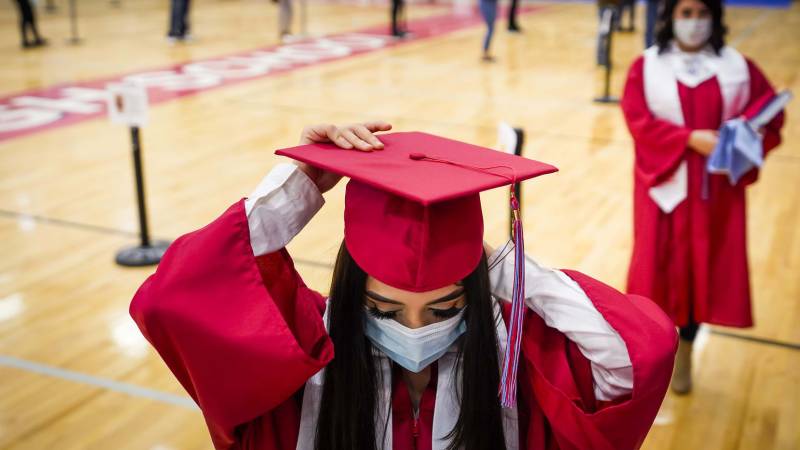Bewilderment, perplexity and confusion envelop the class of 2020 as it graduates amid the pandemic. Struck by Covid-19; neither they walked on the graduation ramp, nor tossed their hats up in the air. Many longed-for group photographs, crazy pictures, high-fives, hugs, and endless talking. Others missed saying goodbyes. Except for some elite universities doing virtual graduation; others are just content with sending degrees to the students’ doorsteps; without any graduation ceremony. Shoved into grave uncertainties; these fresh graduates feel immensely stressed as they leave behind the structure of their universities amongst the everyday news of shrinking economies and downsizing across the globe.
In the United States, more than 33 million people are laid off during the pandemic. The internship offers withdrawn; new hiring stopped. The situation in Pakistan is even worse where the unemployment was a menace even before Covid-19 hit the country. Afterwards, the situation turned awful. The crumbling economy, negative growth rate, foreign debts, and an exploding population strip the new job-seekers of any optimism left for their future. Even the privileged ones coming from rich backgrounds are not an exception. Their prospects of flying abroad for study or jobs have been devoured by the pandemic.
Many fresh graduates in Pakistan are straining under immense mental problems; buckling under the pressure their parents and peers put on them for finding a job. The tendency exacerbates their psychological, social, and financial issues; leading many of them to face a mental crisis or even ending their lives.
“My mom sold her gold bracelets to pay for my studies, without any job how can I support her and my other five siblings?” Asked Assad, a fresh engineering graduate, whose hopes are razed to the ground due to the pandemic. To his utter dismay; his job offers retracted during the lockdown.
“My family survives on my father’s pension. He contacted Covid-19 and can no longer work. I see no hope for my future,” said Salma with brimmed eyes. Four years ago when she left Gujrat to join a university in Lahore, she envisioned a bright future not knowing she will graduate in a global pandemic.
One finds similar accounts from plenty of other graduates. Clueless about their future, they need professional counseling, career planning, and psychological aid to make a leap from the universities to their careers in the time of crisis.
Pakistani universities must realise the challenges that newly passed out graduates face and should extend campus resources, such as career services or counseling, beyond commencement like their counterparts in the USA. The universities can also offer ‘fast track’ admissions to fresh graduates without the pre-requisite of standard testing and application fee. The faculty step in. They should help to generate a sense of purpose and connection amongst the graduates; teaching them how to survive the period of unemployment? How to tap opportunities? What skill sets are required in a post-pandemic world? All these questions need to be answered for the graduates entering the workforce.
The government and private sector must specify the number of job openings they expect to create in various sectors within a timeline. This will help the fresh graduates to comprehend the changing job market and learn new skills as they wait for the right job.
Online platforms like Edx, Coursera, Khan Academy, etc. can help them get certifications for communication, presentation skills, team building, and leadership qualities. These attributes are highly prized in the professional world. Learning soft skills can be a life-changer too. Many students especially those coming from far-flung areas sheerly lack it. Mostly have strong concepts but fail to articulate them in interviews. The fresh graduates can use their time of unemployment to brush up these skills.
Incubation centres offer another avenue of opportunities. Students can create, collaborate, or work for a startup to enhance their work experience. Several startups have emerged lately due to the surge in digitalization and entrepreneurship across the country. Universities like LUMS, UET, and NUST are the hub of incubation centres. Upgradation to 5G in Pakistan will create a boom in the telecommunication industry.
Lastly, small jobs often termed as ‘odd jobs’ among the Pakistani-American community can be a way forward in Pakistani’s crippled economy. The taboo needs a spanking. It not only shut doors for many but also keep graduates languishing at home for years for their ‘dream jobs’. Rarely it comes. Even if it comes, it does not stay long often.
Lessons from my class where I work as a Teaching Assistant in the USA can help Pakistani fresh graduates to find a way out. Most of my students earned their livings by working as waiters, receptionists, librarians, IT-troubleshooters, technical aid, carpenters, and bus drivers both on and off-campus. However, Pakistan’s psyche is different.
In ‘reel life’ we admire characters like Ertugrul, the protagonist of the Turkish TV series Dirilus, who is determined to change the world. But in real life, we are just massaging our false egos and wait for a miracle.
The fresh graduates and job seekers can seamlessly sail through the turbulent times by embracing the uncertainty and abridging the gap between expectations and the ‘new reality’. For good or bad; we must know, the world will never be the same again!






